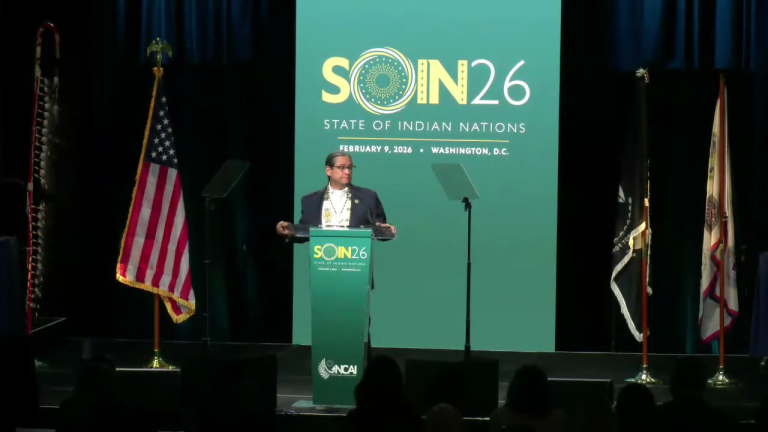by Antonia Gonzales and Sarah Gustavus
Researchers point to social determinants as contributing to the health and wellness of communities including social structures and economic systems. Social determinants of health in Indian Country often include limited health care services, overcrowded housing, lack of fitness centers and outdoor recreational areas, infrastructure needs such as roads and sidewalks, and other living conditions related to poverty. To help overcome some of these challenges, examples of resiliency can be found in Native America through individuals who promote health and wellness at the grassroots level.
Loren Anthony is a Navajo actor, health advocate and motivational speaker from Gallup, New Mexico. He has been doing meal preparation for about seven years as a way to improve his own health. Anthony now offers the meals for the public to purchase after seeing a need in the reservation border town of Gallup.
“I feel like it’s important to prepare. If you don’t, you’re going to pull off to fast food, and eat something not good for you,” said Anthony.
High calorie, processed foods can be found at every corner in Gallup, and topped off with many sugary drink options. Gallup is a town where people from the Navajo reservation and Zuni Pueblo often travel to for grocery shopping.
“I want our people, our community to be healthy,” said Anthony. “There are so many people who struggle, and the real health care plans are at home.”
Food deserts, places which lack access to fresh, healthy foods, are common on many reservations and surrounding areas. According to some health experts, people can still make better choices with what is available to them.
Heidi Gabalski is a nutritionist and exercise physiologist at the Native Americans for Community Action’s Wellness Center in Flagstaff, Arizona.
Gabalski’s clients often have to pick foods from a convenience store or make meals from federal commodity boxes.
“Look at the commodity box and make better options,” said Gabalski. “If you’re going to eat the fruit cocktail then rinse it. Flour, do we have to fry it? Make dry bread.”
Gabalski recommends choosing foods that are baked, broiled and steamed. She also encourages drinking water over soda.
Loren Anthony’s menu of choice is often grilled chicken, rice and vegetables, which he measures with cups and weighs on a food scale. One of these types of meals is under 400 calories, compared to fast food options, which can add up to 800 or more.
“We don’t go hunting, we used to do that. We would build a fire. If you do that you put work into it, and we don’t do that,” said Anthony.
Healthy living has not always been a priority for Loren. He started to make changes in his health in 2009 after living a life he says included drinking alcohol, being overweight and depressed. Anthony recalls reaching a low point and then decided to turn his physical and mental health around, which eventually lead him to help people today with their diets and exercise.
LaRena Morris is the girls head varsity coach at Gallup High School. She recently asked Anthony to hold a session with her players to work on bonding and team building. Morris says she sees many young people in Gallup and the surrounding area facing many challenges including transportation and financial issues linked to poverty.
“He’s the support they need, I see a lot of things he does. They gravitate toward that, it encourages them to do better,” said Morris. “What I really like about Loren is he does not charge for his services. If I would go out looking for some type of assistance they would be charging thousands of dollars to come out and do what he does.”
Anthony’s passion for helping people stems from overcoming many challenges in his own life.
“I can relate to my (Native) people very well because we’ve been through the same position. I understand,” said Anthony. “I don’t want people to give up. When I speak to youth I don’t want them to give up. We can always pick it up and say I want to be a leader.”
According to health professionals, consistency in eating and a strong support system are associated with long term success in weight loss and weight maintenance, which grassroots leaders are striving for in Indian Country.





